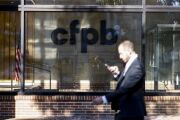Some banks do not have proof that their customers have "opted-in" to overdraft services, and the Consumer Financial Protection Bureau is reminding financial institutions to maintain records of consumer consent before charging overdraft fees.
On Tuesday, the CFPB published guidance reiterating that banks cannot charge overdraft fees unless consumers have affirmatively opted in. The guidance is designed to remind banks that they cannot charge overdraft fees unless they have proof of opt-in agreements, as required by the Electronic Fund Transfer Act.
"The CFPB has found instances where banks have no evidence that they obtained consent for overdraft," Director Rohit Chopra said in a press release. "No Americans should be hit with bank account fees that they never agreed to."
The guidance comes ahead of a final CFPB rule on overdraft fees. In January, the bureau proposed a rule that would slash overdraft fees to as low as $3. The proposal would apply only to the largest banks, which would be able to recoup their costs or charge a maximum overdraft fee of $14 under a benchmark set by the government. The proposed overdraft rule would apply only to about 175 large banks and would classify overdraft services as extensions of credit. The proposal would apply consumer protections such as interest rate disclosures to overdraft services.
Chopra has acknowledged that banks have made dramatic changes in reducing overdraft fees in the last few years. Banks typically charge $35 for overdraft protection. Consumer advocates have long urged the bureau to crack down on overdraft fees, which some consider to be a hidden form of high-cost credit, or a so-called junk fee, in which the charge far exceeds a bank's cost of covering an overdraft.
The guidance reiterates the CFPB's position that banks must keep records of consumers' opt-in preferences in order to charge overdraft fees. Some banks may need to check their records to ensure they have confirmation from customers or they may have to reach out to consumers again.
The bureau provided examples of the type of evidence it expects banks to keep as proof of opting in to overdraft including a signed form, a recording of a phone call or an electronic signature. Currently some banks make a notation in their systems that a consumer has opted in to overdraft protection since phone calls cannot always be recorded.
"The circular says a call recording is good evidence, but a bank may have to get a consumer's consent to record a phone call," said Scott Pearson, partner and leader of consumer financial services at Manatt, Phelps & Phillips. "There are other ways to prove consent, such as making a note in the system to document the customer's oral agreement."
Atlantic Union Bank, TD Bank, Regions Bank and other banks have been hit with CFPB enforcement actions for violating the Electronic Fund Transfer Act by misleading consumers into enrolling in overdraft services without providing the proper disclosures. The law's implementing regulation, Regulation E, establishes an opt-in regime where the default condition is that consumers are not enrolled in overdraft services and financial institutions are prohibited from charging fees until the consumer affirmatively consents to enroll.







